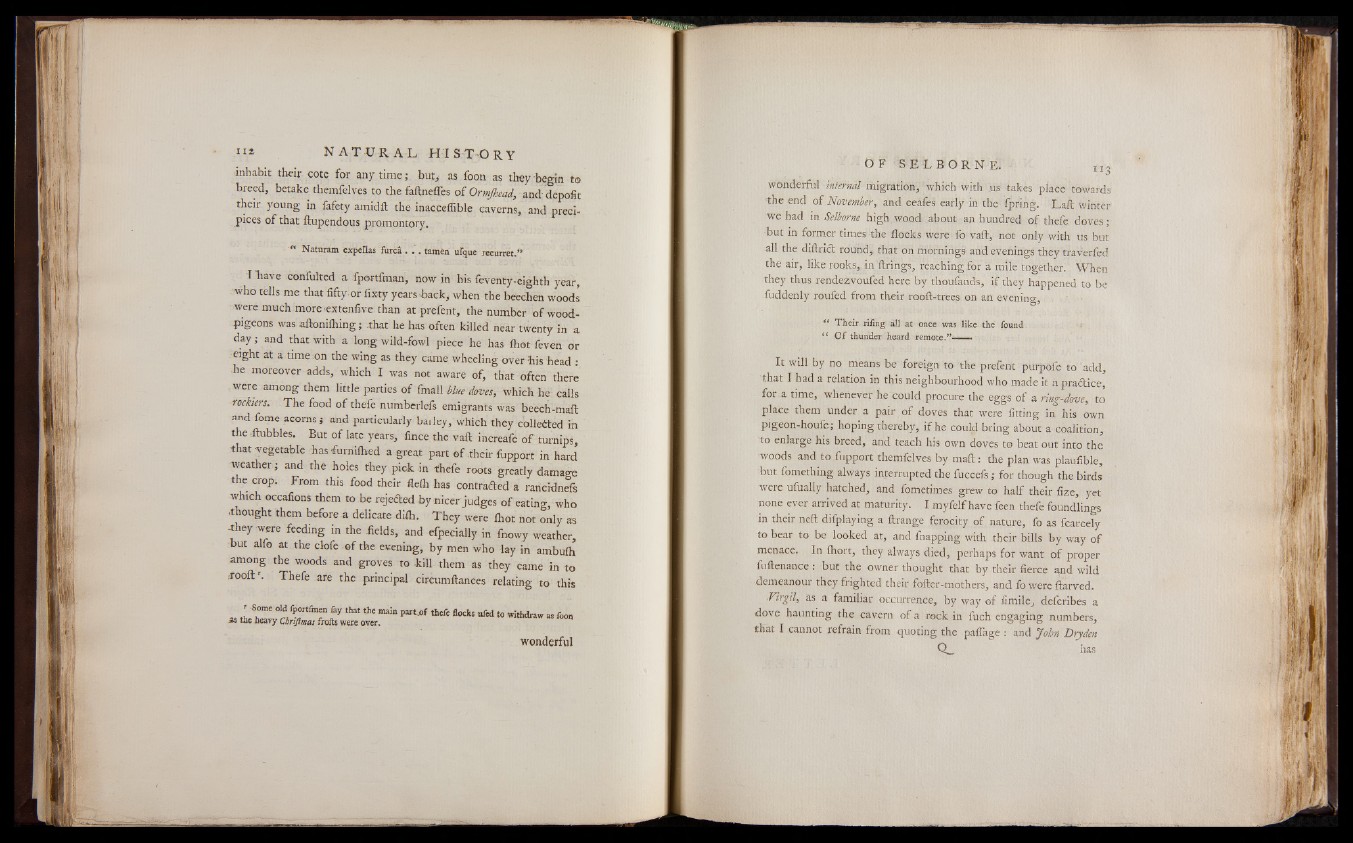
inhabit their cote for any time; but, as foon as they begin to
breed, betake themfelves to the faftnefles of Ormjhead, and depofit
their young in fafety amidft the inaccefiible caverns, and precipices
of that flupendous promontory,
Naturam cxpellas furca • • • tamcn ufou© recurrct.**
Iliave confulted a fportfman, nowin his feventy-eighth year,
who tells me that fifty.or fixty years.back, when the beechen woods
were much more -extenfive than at prefent, the number of wood-
pigeons was aftonithing; .that he has often killed near twenty in a
day; and that with a long wild-fowl piece he has fhot feven or
eight at a time on the wing as they came wheeling over his head :
.he moreover adds, which I was not aware of, that often there
were among them little parties of fmall blue doves, which he calls
rochers. The food of thefe numberlefs emigrants was beech-maft
and fome acorns; and particularly barley, which they colledted in
the Hubbles. But of late years, fince the vaft increafe of turnips,
that vegetable has furnilhed a great part of their fopport in hard
weather; and the holes they pick in thefe roots greatly damage
the crop. From this food their flelh has contra&ed a rancidnefs
which occafions them to be rejedted by nicer judges of eating who
•thought them before a delicate did. They were fhot not only as
they were feeding in the fields, and efpecially in fnowy weather,
but alfo at the clofe ©f the evening, by men who lay in ambufh
among the woods and groves to bill them as they came in to
a-ooft'. Thefe are the principal circumflances relating to this
I Some old fportfinen % that the main partnf thefe flocks ufed
as the heavy Cbrijtmas frolts were over. to withdraw as Ibon
wonderful
wonderful internal migration, which with us takes place towards
the end of November, and ceafes early in the fprihg. Laft winter
we had in Selborne high,wood about an hundred of thefe doves;
but in former times the flocks were fb vaft, not only with us but
all the diftrict round, that on mornings and evenings they traverfed
the air, like rooks, in firings, reaching for a mile together. When
they thus rendezvoufed here by thoufands, if they happened to be
fuddenly roufed from their rooft-trees on an evening,
“ Their rifing all at once was like- the found
ft O f thunder heard remote.” .......
It will by no means be foreign to the prefent purpofe to “add,
that I had a relation in this neighbourhood who made it a practice,
for.a time, whenever he Could procure the eggs of a ring-dove, to
place them under a pair of doves that were fitting in his own
pigeon-houfe; hoping thereby, if he could bring about a coalition,
to enlarge his breed, and teach his own doves to beat out into the
•woods and to fupport themfelves by maft: the plan was plaufible,
but fomething always interrupted the fuccefs; for though the birds
were ufually hatched, and fometimes grew to half their fize, yet
none ever arrived at maturity. I myfelf have feen thefe foundlings
in their neft difplaying a ftrange ferocity of nature, fo as fcarcely
to bear to be looked at, and fnapping with their bills by way of
menace. In ftiort, they always died, perhaps for want of proper
fuftenance : but the owner thought that by their fierce and wild
demeanour they frighted their fofter-mothers, and fo were ftarved.
•Virgil, as a familiar occurrence, by way of fimile, defcribes a
dove haunting the cavern of a rock in fuch engaging numbers,
that I cannot refrain from quoting the pafiage : and John Dryden
Q> lias